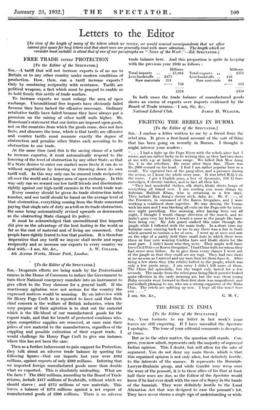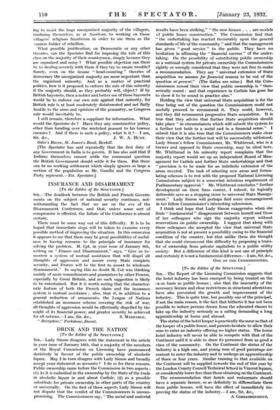THE ISSUE IN INDIA
[To the Editor of the SPECTATOR.] SIR,--Your footnote to my letter in last week's issue leaves me still enquiring. If I have miscalled the Spectator I apologise. The tone of your editorial comments is deceptive at times.
But as to the other matter, the question still stands. Con- gress, you now admit, represents only the majority of organizer! Indian opinion. This I doubt, but will allow for the sake of argument. You do not deny my main thesis, which is that this organized opinion is not only alien, but definitely hostile, to the interests of the masses. It represents the Bunniah- Lawyer-Brahmin group, and while Gandhi may weep over the woes of the peasant, it is to these allies of his that at least half their woes are due, as the Editor of the Spectator would know if he had ever dealt with the case of a Sepoy in the hands of the bunniah. They were definitely hostile to the Land Alienation Act that was designed to ease the peasant's lot. They have never shown a single sign of understanding or wish-
ing to assist the huge unorganized majority of the villagers, 'confining themselves, as at Amritsar, to working on those villagers' religious fanaticism in order to use them as the cannon fodder of rebellion.
What possible justification, on Democratic or any other theories, can the Spectator find for imposing the rule of this class on the majority of their countrymen, simply because they are organized and noisy ? What possible objection can there he to dealing severely with them if they try to create trouble? Surely, even on the insane " head-counting " theories of democracy the unorganized majority are more important than the organized minority. And as a matter of practical politics, bow is it proposed to enforce the rule of this minority if the majority should, as they probably will, object ? If by British bayonets, then a nobler and better use of those bayonets would be to enforce our own rule against that minority, for British rule is at least moderately disinterested and not flatly hostile to the aims and opinions of the peasantry, as Congress rule would inevitably be.
I still remain, therefore a suppliant for information. What would the Spectator do ? Have they any constructive policy, other than handing over the wretched peasant to his townee enemies ? And if there is such a policy, what is it 1— I am,
[The Spectator has said repeatedly that the first duty of any Government in India is to govern. It has also said that if Indians themselves cannot settle the communal question the British Government should settle it for them. But there can be no working settlement which simply ignores so large a section of the population as Mr. Gandhi and the Congress Party represent.—En. Spectator.]





































 Previous page
Previous page